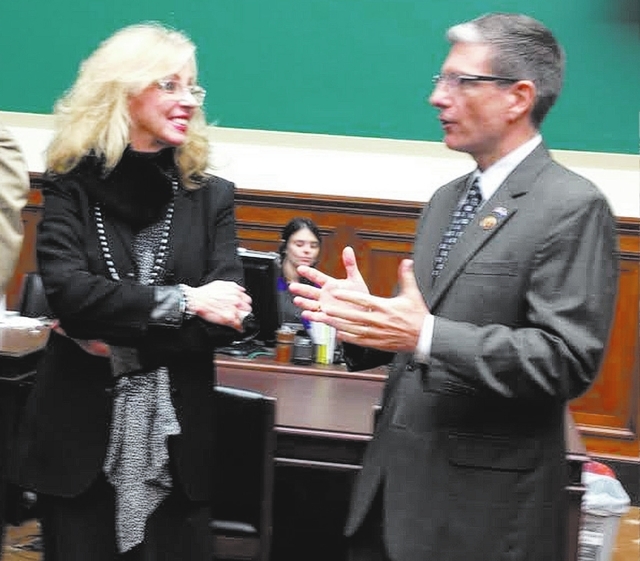Gaming industry’s rift on Internet gambling seen at hearing
WASHINGTON — The split within the Las Vegas casino industry over Internet gambling was on full display Tuesday when U.S. House lawmakers explored if there’s any appetite for federal government involvement in Web-based gaming.
The chief executive of the American Gaming Association told lawmakers that online gambling, already legal in Nevada, New Jersey and Delaware, is here to stay, and major gaming companies seek federal approval and standards to guide a transition into that market.
“It’s not often an industry comes to you asking for regulation,” Geoff Freeman told lawmakers. “The gaming industry is coming to you today.”
But sitting beside Freeman was a senior vice president of the Las Vegas Sands, whose billionaire chairman Sheldon Adelson is committing millions of dollars in a lobbying bid to nip the expansion of online gambling in Washington and in states where it is being considered.
“Internet gambling takes gambling too far,” said Andrew Abboud, who said the gaming industry “rushed to the marketplace” after a December 2011 reinterpretation of federal wire law by the Department of Justice cleared the way.
“Just because we can doesn’t mean we should,” Abboud said. He said implications for child safety, problem gamblers and the health of brick and mortar operations have been underestimated.
Freeman’s call for a federal green light on Web gaming was echoed by John Pappas, executive director of the Poker Players Alliance, the organization of 1.2 million poker enthusiasts. Abboud was backed by Les Bernal, national director of the advocacy group Stop Predatory Gambling
The hearing by the commerce, manufacturing and trade subcommittee was the first one in the House since late 2011, and the first one where Adelson’s company had a seat at the table. The Senate held a hearing earlier this year, but there has been no further public movement there as well.
Rep. Lee Terry, R-Neb., who was the chairman at Tuesday’s hearing, said it appeared there still is “absolutely no” consensus for Congress to act one way or the other.
“There is really nothing on the agenda next for this,” Terry said after the hearing. “We are going to see how things are evolving in Nevada and New Jersey and other states.”
“Is there really something that forces the feds to get into this right now? And I don’t think a case was really made,” Terry said. When it comes to setting parameters for Internet gambling, where issues of technology and privacy come into play, “I don’t know how you can do that.”
While a Washington, D.C., snowstorm held down attendance at the hearing, lobbyists for Sands, MGM Resorts, Caesars Entertainment and Station Casinos were in the audience, as well as representatives for Indian tribes that also are split on online gaming.
Rep. Marsha Blackburn, R-Tenn., said she was receiving a stream of Twitter messages from poker players who were watching online. Rep. Joe Barton, R-Texas, pointed out the committee’s last hearing on Internet gaming drew its largest online audience.
At the hearing several lawmakers challenged Sands’ opposition to Internet gaming when it allows customers the use of tablets to place wagers on its property with Cantor Gaming the vendor for such “mobile gaming.”
“It feels to me a little hypocritical,” said Rep. Jan Schakowsky, D-Ill.
Rep. Joe Barton, R-Texas, displayed a mobile gaming ad for the Venetian, a Sands property, and pressed Abboud.
“What you are advertising here is the same thing that we are talking about,” said Barton, who has sponsored a bill to legalize web poker. “it’s just a matter of how wide the geography is, or the wireless connection.”
Abboud responded mobile gaming is limited to the property, and that customers have to interact with someone at the casino cage to obtain a device.
“That is a very controlled environment, in a regulated state, and can only be done within the walls of our building,” he said.
The Justice Department’s reinterpretation of the 1961 Wire Act on Dec. 23, 2011, opened the door to Internet gambling except for sports wagering. But Terry pointed out it is not a law, and in the absence of Congress acting, he wondered what would happen if a future presidential administration chose to reverse field.
“The Wire Act can be overturned at any moment,” Abboud said, asking lawmakers to pass legislation to restore the more restrictive interpretation of the statute. “The states going forward are doing so at great risk.”
But Freeman asked Congress to go in the opposite direction — ratify the latest interpretation and add regulations that would protect consumers, punish cheaters, ensure children aren’t playing and assist problem gamblers,
“The prohibition of online gaming has not and will not work,” Freeman said. “The government cannot put the Internet back into the bottle. The demand for online gaming will only continue to grow.”
Contact Stephens Washington Bureau Chief Steve Tetreault at stetreault@stephensmedia.com or 202-783-1760. Follow on Twitter @STetreaultDC.

















